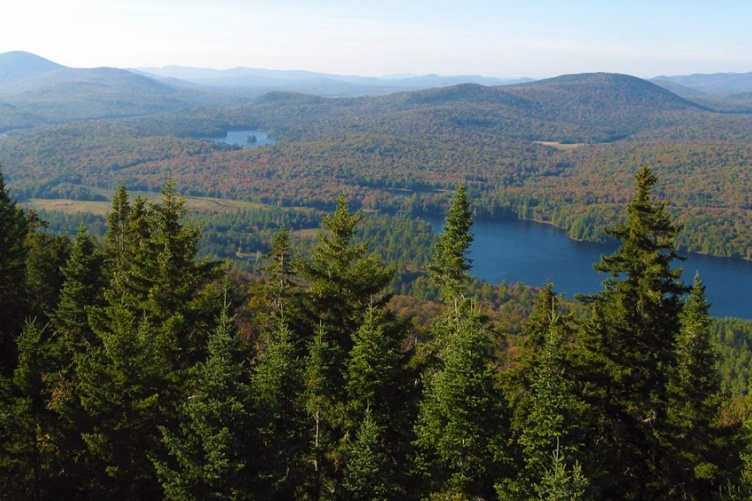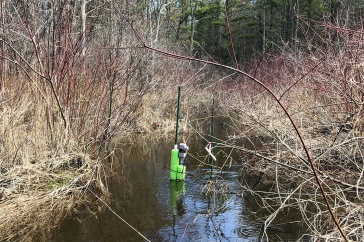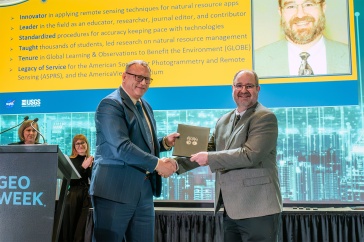
The Northern States Research Cooperative is a vital source of funding for applied forest research and outreach efforts throughout the Northern Forest.
Following a three-year hiatus, the Northeastern States Research Cooperative has been revitalized, thanks to $2 million in funding for the 2020 fiscal year from the U.S. Forest Service. The grant program originated in New Hampshire and has supported research conducted by New Hampshire Agricultural Experiment Station scientists and Hubbard Brook researchers, including studies that investigate winter climate change, water quality, forest inventory management, and changes in forest ecosystems.
The cooperative is a competitive grant program that promotes high-quality research on forest and community sustainability and funded more than 335 research projects in the Northeastern Forest in Maine, New Hampshire, Vermont, and New York from 2001 to 2016. It was first created by Sen. Patrick Leahy (D-Vt.) in 1998 as part of the Farm Bill and will be relaunching with a new strategic vision in 2020.
Sen. Jeanne Shaheen Key Supporter

Hubbard Brook Research Foundation for a 2018 science
briefing on the Northeastern States Research Cooperative.
(Credit: Hubbard Brook Research Foundation)
N.H. Agricultural Experiment Station researcher William McDowell, UNH professor of environmental science and one of the directors of the Northeastern States Research Cooperative, said Sen. Jeanne Shaheen (D-N.H.) was instrumental in helping secure the new funding.
“Senator Shaheen has long supported our research efforts at the university. She played a central role in helping to reinstate funding to revitalize this grant program. For nearly 20 years, the Northeastern States Research Cooperative has supported applied forest research that benefits a thriving forest economy and helps to protect ecosystem and forest health. With this support, our researchers once again will have the resources needed to help maintain this vast natural resource,” McDowell said.
Anthea Lavallee, executive director of the Hubbard Brook Research Foundation and member of the cooperative leadership team, praised Shaheen’s dedication to renewing the program. “At the foundation’s 2018 annual meeting, Senator Shaheen declared her commitment to the Northeastern States Research Cooperative by sharing a strong statement of full support. It was clear that she understood what was at stake and was willing to go to bat for renewal. It is incredibly gratifying to know that New Hampshire’s congressional delegation appreciates the power of science to inform policy and practice.”
Forest Productivity, Health Top Research Goals
The cooperative will look to the Northeastern Forest community for specific research needs that will become the focus of funded projects, rather than soliciting proposals that fit within broad themes like forest productivity and ecosystem health.
“We plan to focus on outcomes that Northeastern Forest communities and stakeholders – anyone who uses, visits or values the forests — find directly relevant and applicable,” McDowell said. “The new format will include greater input from the stakeholder community, and each year we will offer a single competition that encourages interdisciplinary research to address one of the stakeholders’ key research questions.”
The Hubbard Brook Research Foundation will lead the community engagement effort to ensure that funded projects align with on-the-ground issues in an economy and culture that depends on forest health.
 “The Hubbard Brook Research Foundation looks forward to engaging stakeholders at the beginning and throughout the program,” Lavallee said. “Research priorities identified by the cooperative’s external advisory committee will inform proposal review criteria. Our goal is to establish ongoing dialogue between the people who depend on healthy forests and the scientists working to understand them.”
“The Hubbard Brook Research Foundation looks forward to engaging stakeholders at the beginning and throughout the program,” Lavallee said. “Research priorities identified by the cooperative’s external advisory committee will inform proposal review criteria. Our goal is to establish ongoing dialogue between the people who depend on healthy forests and the scientists working to understand them.”
The Northeastern Forest is a 26 million acre working landscape with unique recreational opportunities, vast forested watersheds, and diverse wildlife. It is home to more than 2 million residents and stretches from eastern Maine, through New Hampshire and Vermont and into Northeastern New York. In the 1980s, the forest was designated a priority for national protection by the Federal government in response to growing concerns that remaining forest land and timber were falling victim to unplanned fragmentation, piecemeal development and real estate speculation.
“The Northeastern Forest is distinctive biologically and socioeconomically. It is home to strongly resource-based communities whose economies rely on extractive industries like logging and paper, hunting, fishing and tourism,” McDowell said. “The cooperative was originally conceived to help address the best way to manage the forest to protect the economies of these communities, while simultaneously addressing forest health, soils, water, biodiversity and wildlife and understanding how each interacts with human economic activity.”
The cooperative is a vital source of funding for applied forest research and outreach efforts throughout the Northeastern Forest, according to McDowell, who said grants for this type of highly specific work are not often available through national programs, which look for research that’s more broadly applicable.
“The value (of the cooperative) for New Hampshire is that the grant program allows us to use the outstanding team of environmental researchers and the data they have collected in service of our communities to try to head off undesirable outcomes,” he said. “Funding research in the Northeastern Forest will help keep the state vibrant and ahead of the curve in terms of understanding what the future might bring.”
UNH Students Benefit

In the 16 years the cooperative was initially active, it received almost $24 million from the U.S. Forest Service and awarded grants ranging from $3,000 to more than $250,000 for projects that resulted in original data, predictive tools, and clear recommendations to manage, protect, and monitor essential natural resources in a region that depends on heathy, working forests. The funding supported the work of more than 200 undergraduates and graduate students, research technicians and postdoctoral researchers and led to more than 300 peer-reviewed scientific publications and approximately 900 professional presentations.
Among those who benefited from the program is Alexandra Contosta, who was a post-doctoral research associate when she received funding to support her work on winter climate change in the Northeastern Forest, including research conducted at the NH Agricultural Experiment Station. The formative experiences she had as a result of the grant are what McDowell describes as “career-changing for a junior scientist.”
Contosta is now a research assistant professor at UNH’s Earth Systems Research Center, and, in fall 2019, her research study examining the last 100 years of weather station data from Northeastern forests across the United States was published in the journal Ecological Applications.
To highlight the cooperative’s professional development impacts, Contosta was invited to participate in a science briefing that the Hubbard Brook Research Foundation hosted for Shaheen in August 2018. Lavallee said Contosta’s presentation was compelling.
“Alix was a terrific Northeastern States Research Cooperative ambassador. She described how the cooperative funded her graduate research at a formative stage, enabling her to explore the intersection of science and society in a rapidly changing winter economy. Alix’s presentation made an indelible impression. It highlighted the potential for the cooperative to empower early -career researchers to span the boundary between science and society,” she said.”
The cooperative is jointly managed by the U.S. Forest Service, four public universities in Maine, New Hampshire, New York, and Vermont, and the Hubbard Brook Research Foundation. Along with McDowell and Lavallee, Aaron Weiskittel from the University of Maine Center for Research on Sustainable Forests, René Germain from the State University of New York College of Environmental Science and Forestry, and William “Breck” Bowden from the University of Vermont Rubenstein School of Environment and Natural Resources serve as directors.
Established in 1955 by the U.S. Forest Service in the N.H. White Mountains, Hubbard Brook brings together scientific teams from more than 25 universities and research institutions. Together they explore the relationships among Hubbard Brook’s plants, animals, air, water, and soils. Hubbard Brook discoveries include acid rain, the impacts of forest harvesting on water quality and quantity, and the effects of extreme weather on forest functions. The foundation is Hubbard Brook’s nonprofit communications arm, working to bridge the gaps between science and society.
Founded in 1887, the NH Agricultural Experiment Station at the UNH College of Life Sciences and Agriculture is UNH’s original research center and an elemental component of New Hampshire's land-grant university heritage and mission. We steward federal and state funding, including support from the USDA National Institute of Food and Agriculture, to provide unbiased and objective research concerning diverse aspects of sustainable agriculture and foods, aquaculture, forest management, and related wildlife, natural resources and rural community topics. We maintain the Woodman and Kingman agronomy and horticultural research farms, the Macfarlane Research Greenhouses, the Fairchild Dairy Teaching and Research Center, and the Organic Dairy Research Farm. Additional properties also provide forage, forests and woodlands in direct support to research, teaching, and outreach.
-
Written By:
Lori Wright, '06G | NH Agricultural Experiment Station | lori.wright@unh.edu | 16038621452
















































